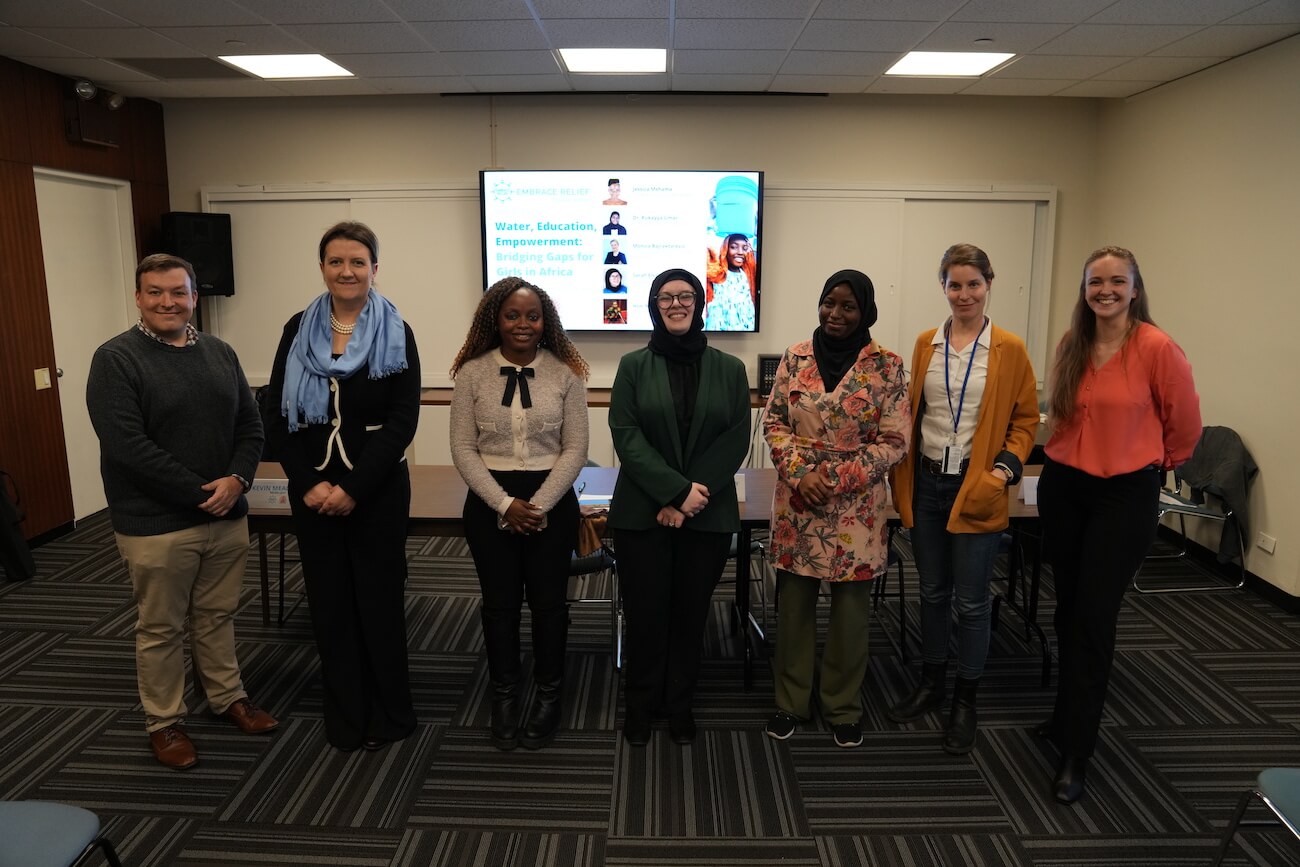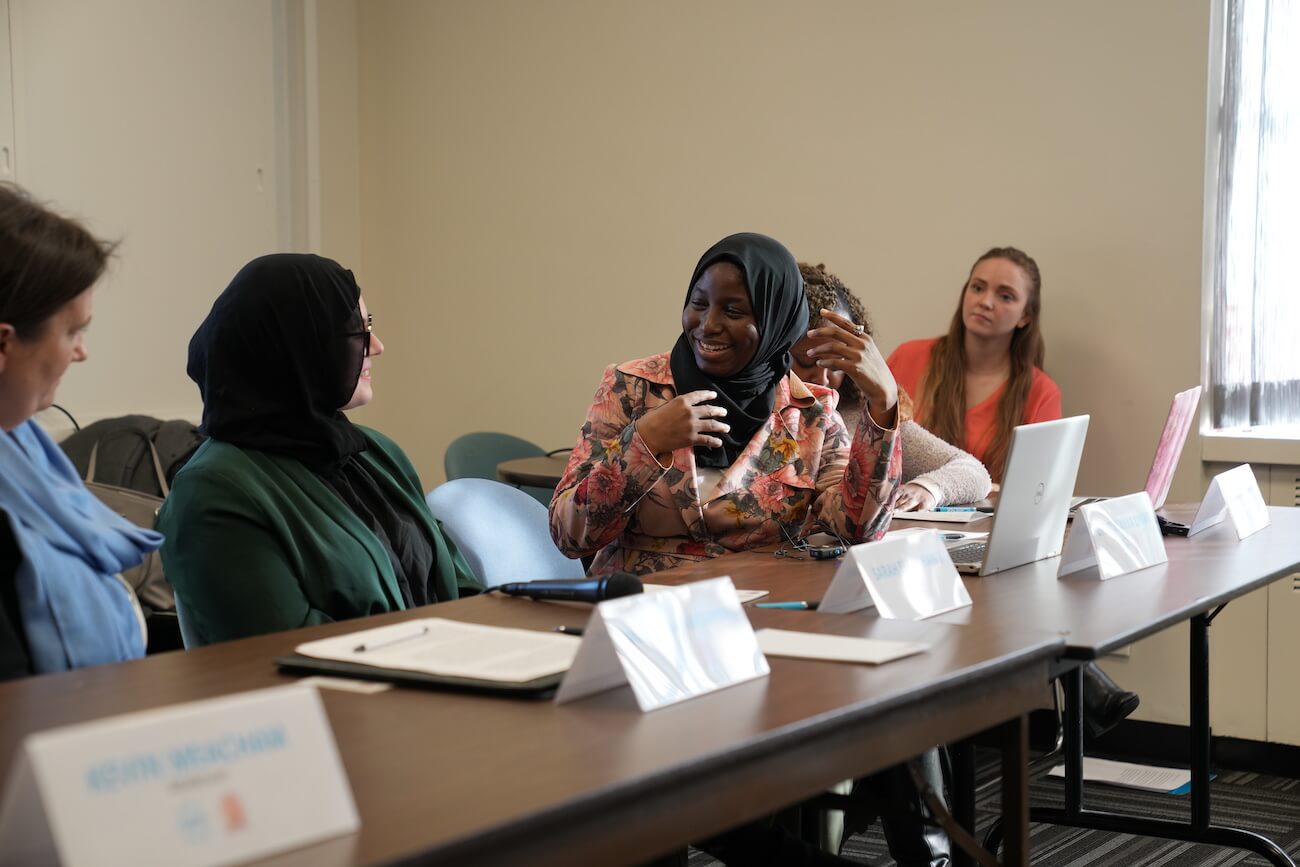The struggle for women’s empowerment and gender equality continues to make slow, steady progress around the world, but there is no doubt that much work remains to be done. In 2024, women worldwide continue to earn less income than their male peers; women are less represented in political and business leadership; women face barriers to education and career opportunities than men.
To overcome these challenges, individuals and organizations can take a number of actions in support of a fairer, more equal world for men and women. Centering women’s voices and ensuring that women are represented amongst the decision makers is a critical step in this direction. Meanwhile, simply acknowledging that the struggle for women’s empowerment is closely intertwined with other social issues creates powerful solidarity, and incentivizes action that achieves multiple goals benefitting disparate groups of people.
On March 21, 2024, Embrace Relief, in collaboration with the Journalists and Writers Foundation, aimed to accomplish both of these goals through a vibrant panel discussion, entitled “Water, Education, Empowerment: Bridging Gaps for Girls in Africa,” at the Church Center for the United Nations in New York. This event was held in parallel with the United Nations’ 68th Commission on the Status of Women (CSW), a two-week event in which stakeholders around the world came together to discuss solutions to the critical issues threatening the progress made towards a more equal world.
As part of the panel, Embrace Relief invited five accomplished women to share their thoughts, experiences and perspectives on related issues whose intersection has a significant impact on the advancement of women’s equality in Africa, namely universal access to clean water, promotion of girls’ education, and the eradication of poverty. Panel speakers included:
- The Hon. Neema Lugangira, a Member of Parliament from Tanzania. Ms. Lugangira has created a successful, lengthy track record of championing reforms and development policies for her country, with a focus on nutrition, community health and digital inclusion.
- Jessica Mshama, a youth ambassador and entrepreneur from Tanzania. Jessica is the founder of Assumption Digital Schools, as well as Nakua Na Taifa Langu, a nonprofit organization dedicated to nurturing the personal growth of young people in Tanzania.
- Dr. Rukayya Umar, a computer science teacher in Greensboro, NC. Born in Nigeria, Rukayya earned a Ph.D. in computer science from Nile University, and has been published in a number of respected journals on topics including machine learning for disease classifications, and robotics.
- Sarah Elsakhawy, the coordinator of Embrace Relief’s Women’s Empowerment programs. A graduate of Seton Hall University with a degree in Diplomacy and International Relations, Sarah has also previously served as Embrace Relief’s Clean Water Initiative program coordinator.
- Monica Bajraktarevic, the Assistant Head of School at Pioneer Academy, an independent K-12 private school located in Wayne, NJ. In her seven years with the school, she has led the school’s Risk Management, Safety, Dean’s Office, Admissions and Marketing efforts. Monica is also a former member of New York City’s Council on High Schools, including serving as Budget Committee Chairman and Capital Plan Co-Chair from 2014-17.
This panel discussion represented Embrace Relief’s first time hosting an parallel event alongside a key United Nations initiative. Special thanks go to NGO CSW/NY, the organizer of dozens of panel discussions during the two-week conference, as well as the Journalists and Writers Foundation for their support in helping to hold this event.

Invest in Water, Invest in Women
The Hon. Neema Lugangira, MP, opened the discussion highlighting positive investments and improvements made in Tanzania in recent years, including more than 1,600 water well projects completed over the past three years, benefitting more than 2,700 villages.
Lugangira noted that President Samia Suluhu Hassan, Tanzania’s first female president, has been heavily involved in creating positive change and development in the country through the funding of infrastructure such as water wells. These wells, she added, help to relieve much of the burden of water-fetching borne by women in Tanzania, freeing up critical time and energy for women to pursue education, join the workforce, or raise stronger families.
“When women are leaders, they know how to deal with community issues,” Lugangira said. “Especially social services that have a huge impact on girls and women … The more we are able to get women into education, into leadership positions, the more women will be able to focus on these social services. And we will be more able to end the vicious cycle of poverty.”
Crucially, Lugangira says, the Tanzanian government has committed to partnering closely with private organizations and nonprofits like Embrace Relief to achieve significant improvements at the community level.
Women’s Economic Empowerment Through Water
In her talk, Jessica Mshama shared a case study of Kongwa District, in the Dodoma region of Tanzania, to explore the links between clean water, education, and women’s empowerment. Clean water, Mshama noted, plays a critical role in development, touching every aspect of society, from public health to the economy to education. This role can be seen in rural Kongwa, where community members face a number of interlocking challenges as a result of water scarcity.
“When we talk about generating income in a woman’s life, we are talking about access to clean water in rural areas,” Mshama said. “They cannot grow what they want to grow in terms of agriculture. They cannot sell their product without enough water supply. If we really want to see change, we should also look to the areas where women live.”
She also noted the important role that access to clean water plays in education. Communities lacking clean water see lower levels of hygiene, which correlates strongly with lower attendance and graduation rates in school. The problem is particularly prevalent among teenage girls, who often lack material support for their menstrual health. Addressing the clean water issue can thus provide a powerful boost to girls in Africa.
Mshama closed by urging all stakeholders to recognize the intersectional nature of the clean water crisis. A world with universal access to clean water is a world where all people, everywhere, have greater opportunities for success and for controlling the course of their lives. It is, therefore, a crucial component of any strategy for global gender equality.
“The heart of the Sustainable Development Goals is pure access to water,” she said. “It integrates everything: economic empowerment, the assurance of quality education, the assurance of vibrant community, and strong markets that can be competitive in the world today.”
Seeing the Potential in Women
Dr. Rukayya Umar related a deeply personal account of her own journey, spotlighting the impact that singular choices can have on a young girl’s life and success. Dr. Umar grew up as the oldest of three sisters in a rural village in northern Nigeria, in a part of the country with particularly low literacy rates, especially for young girls, due to factors including poverty and sociocultural norms.
“You would see a lot of kids start going to school, and then stop,” she said. “And a lot of them, the reason they stop … we have our [cultural] beliefs, such as that a girl child might grow up to a certain age, and then it is time for her to get married. And then that is it.”
However, Dr. Umar’s life took a very different path thanks to her father, who worked alongside women in the country’s Ministry of Justice. Being in an environment with successful professional women, Rukayya’s father was convinced to let his daughters continue their education and pursue a fulfilling career of their own. Dr. Umar was sent to a boarding school, eventually passed her university entrance exams, and worked her way up to earn both a Ph.D. and Master’s degree in computer science.
Dr. Umar closed by incorporating her experiences into a list of recommendations for actions that can be taken to promote girls’ education and achievement. Among these are providing special support and mentorship for girls from a young age, increasing the proportion of female teachers, challenging cultural norms, and celebrating female role models.
“With the right support, and in the right environment, the girls in my community will get it right,” she said. “They will reach any target you set for them.”
A Long-Term Outlook
Sarah Elsakhawy presented several key Embrace Relief initiatives supporting the empowerment of women in Africa, which aim to create educated, entrepreneurial women in Tanzania, Kenya, Nigeria and Uganda.
These programs include:
- The R.I.S.E. scholarship program, which supports female teachers in Tanzania seeking advanced degrees which will allow them to become administrators in the country’s school system
- The S.E.E.D. entrepreneur program, which provides chickens and goats to women in Uganda, Nigeria and Kenya, enabling the beneficiaries to sell dairy products and eggs – a renewable resource that can provide the foundation for a thriving small agribusiness.
- The K.E.E.N. education program, which provides comprehensive training for seamstresses in Kenya, as well as material support (in the form of a sewing machine) upon completion of the course, with the goal of encouraging the graduates to open their own small business.
Elsakhawy noted that Embrace Relief’s multi-faceted approach to empowering women offers short-term benefits for the current generation of women, while also working to create the conditions for a brighter future for the next generation.
“Whether it’s distributing food and supplies, or constructing wells, or through supporting an economic development program, we’re working to address the root causes of inequality so that in the future, fewer women are facing these problems,” she said.
Empowering Children Through Education
In her talk, Monica Bajraktarevic drew upon her background as an educator, as well as her firsthand experience of visiting Africa on humanitarian trips with her Pioneer Academy students, to stress the importance of education as a leveller for all.
Bajraktarevic noted the link between material barriers that millions of girls in Africa face, such as a lack of clean water, with lower rates of educational attainment. Only by addressing these challenges, she noted, can we create the conditions to allow young people in Africa to thrive.
“Education is the biggest difference among people,” she said. “Let’s empower our kids to study, reach their full potential and be as strong as they can be to make this world a better place for themselves and all of us.”
She described Pioneer Academy’s trip to Tanzania as “life-changing.” During their visit, the students helped to open a water well and visited an orphanage, where they provided food and mingled with the children. Bajraktarevic described joyous scenes as the students celebrated with their new friends.
She believes that the experience was beneficial for both parties; the children and community members in Tanzania seeing tangible improvements in their quality of life, and the Pioneer Academy students gaining empathy and an understanding of the role they can play in making the world a better place. Case in point, Bajraktarevic said that the trip inspired her son, currently a college student, to seek out a career path as a diplomat, where he can serve as an agent of change.
About Embrace Relief
Founded in 2008, Embrace Relief’s mission is to deliver research-based, sustainable solutions to achieve immediate and lasting improvements in situations of humanitarian emergency and improving the quality of life of individuals and communities enduring chronic hardships. Based in Fairfield, New Jersey, Embrace Relief operates eight humanitarian relief programs year-round and has provided aid to more than 7 million people in over 50 countries to date.
About the Journalists and Writers Foundation
The Journalists and Writers Foundation is an international civil society organization
dedicated to a culture of peace, human rights and sustainable development.
Based in New York, the JWF boasts more than 52 Global Partners (of which Embrace Relief is one) located in 27 different countries.





















